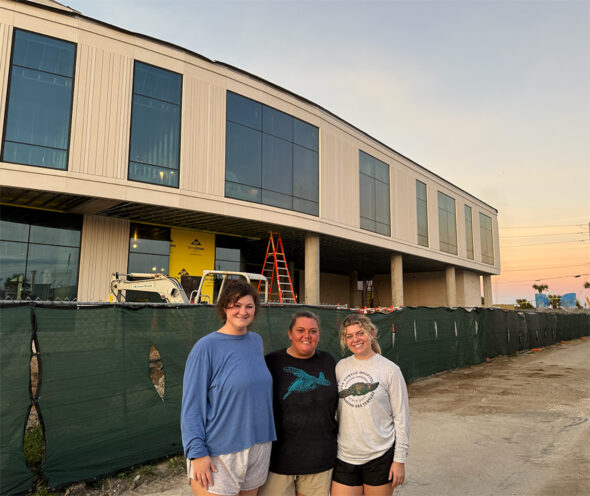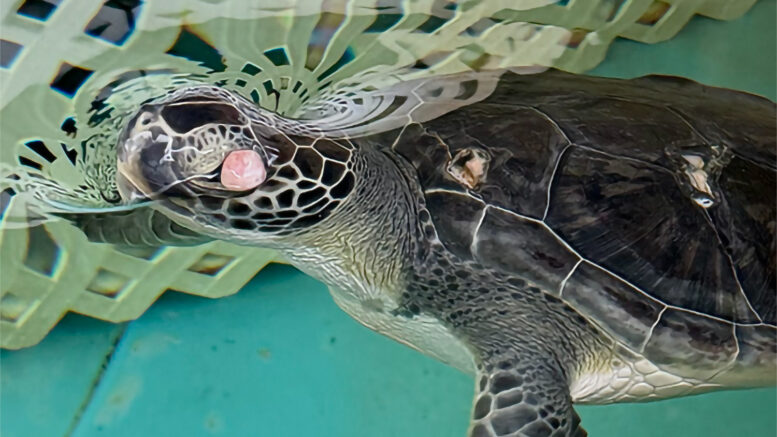By Zoey Nettles
Over 41,000 sea turtle hatchlings were reported to have emerged across St. Johns County beaches this year. With sea turtle numbers rising, the conservation of these animals is a trending subject.
St. Augustine’s Sea Turtle Hospital has been conducting research and raising awareness of the threats that sea turtles face in this area and how locals and visitors can get involved.
The sea turtle hospital at Whitney Laboratory, 9505 North Ocean Shore Blvd, has been open for nine years and has seen a record-breaking 181 turtles this year.
Devon Ramia is the hospital manager.
“Our mission statement is to promote ocean awareness and conservation through sea turtle research and education and to learn from each individual that comes into our hospital,” Ramia said.
The hospital wants to educate the public about how amazing these animals are and why we must protect them. There are higher sea turtle populations now, so more injured and sick turtles are coming in.
“We are expanding, and we are hopeful to have a brand new turtle hospital by the beginning of 2026 that will just revamp our mission and our goals,” Ramia said. “And bring more people in and show more people our world.”

the hospital manager, Devon Ramia (center), in front of the new laboratory building. The
building is expected to be finished in May of 2025, but will not be open until the beginning of
2026. Photo by Zoey Nettles.
The sea turtle hospital at Whitney Laboratory has rehabilitated and released more than 80 sea turtles since opening and is looking forward to being able to house and rehabilitate many more.
“Our hospital is unique in the fact that we specialize in a disease called fibropapillomatosis or
FP,” Ramia said. “Being part of a working research lab is amazing.”
FP is a disease that originated in the Keys in the 1930s and causes tumors to appear and spread on the tissue of sea turtles.
The virus has spread up the coastline and cases are increasing. This sea turtle hospital is dedicated to researching and rehabilitating such infected animals.
Kaylee Hargis is one of the animal care technicians at the hospital. She said that working at this hospital has really opened her eyes to the FP virus and how much it impacts the turtles.
“We put in the work, and we remove all these tumors, and seeing their personality change from them becoming healthy is my big part of what I look for in all these patients,” Hargis said.
Even though the hospital specializes in FP tumors, the biggest threats to sea turtles right now are boat strikes and plastic ingestion.
“The turtles in St. Johns County especially love the Conch House Marina,” Ramia said. “We see
a lot in that area, and they are defecating plastic. They will sometimes eat whatever is floating by.”
Residents and tourists of St. Augustine must understand that they share the area with these animals. When more people become aware of the threats facing these animals, they are less likely to keep happening.
“Picking up any type of trash, even if it’s not yours, is huge. If everyone can just pick up a bag of
trash on a walk, it definitely helps.” Ramia said.
The hospital has also seen an increase in boat vessel strikes. The good thing about seeing more of them is that it means there are more sea turtles, but unfortunately, turtles are still getting hurt.
“We need to respect the wake zones and remember animals call it home,” Ramia said. “People will not get in trouble if they accidentally hit a turtle with their boat. The best thing to do is to call Florida Fish and Wildlife.
Leah Adelmann is another one of the animal care technicians at the hospital. She has worked with marine life for six years and has seen many sea turtles.
“If the animal is hanging out on the beach or is just floating at the surface, that’s not normal,”
Adelmann said. “We always just tell people to go ahead and call Florida Fish and Wildlife.”
Regulations require you not to touch sea turtles without permission, even if you suspect one is hurt or stranded. Calling the FWC hotline is always the best thing to do.
“They have been here since dinosaurs; they’ve overcome so much development and growth and change in the world,” Ramia said.
The oceans are changing quickly, and sea turtles are unable to keep up with the changes that humans are making. Therefore, the sea turtles need our help.
“People should take time to appreciate the natural environment we have, and consider that, and try to be good stewards of leaving the place a better place than we found it,” Ramia said.
To reach the FWC hotline, call 1-888-404-3922 or email SeaTurtleStranding@MyFWC.com.




Be the first to comment on "How St. Augustine’s Sea Turtle Hospital is Addressing Local Threats and Encouraging Conservation"